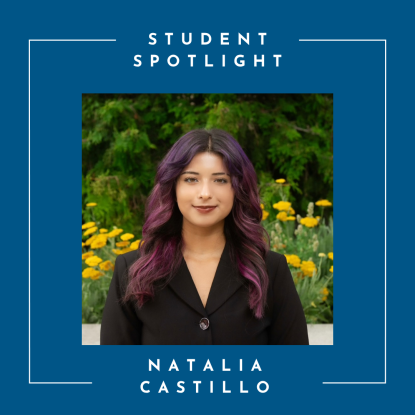Student Spotlight – Natalia Castillo
Meet UCLA undergraduate researcher Natalia Castillo!
Natalia Castillo is majoring in Cognitive Science with a minor in Art History. She is part of the UCLA/Keck Humanistic Inquiry Research Awards program. Natalia’s research project is “Madness and Modernity: French Visual Culture and Psychiatric Discovery in the Long Eighteenth Century.”
How did you first get interested in your research project?
My interest in this project began at the intersection of my studies in Cognitive Science and Art History, and my personal experiences with mental health advocacy. I’ve long been fascinated by how people have tried to visualize psychological suffering before there was language to describe it. When I started studying eighteenth-century France, I noticed how often artists depicted emotional turmoil and social disorder during times of political crisis. That overlap between visual culture and the emerging understanding of the mind drew me in. I realized that art didn’t just reflect madness—it helped define what it meant. This project became a way for me to bridge my academic interests with my desire to understand how societies make sense of mental illness and collective trauma.
What has been the most exciting aspect of your research so far?
The most exciting part has been realizing how alive these artworks still feel. When I look at pieces like Lagrenée’s “La Mélancolie,” I can see how artists were trying to translate emotions that people did not yet have scientific terms for: fear, disillusionment, grief. Tracing how those emotions traveled from canvas to clinic, shaping how people thought about madness and healing, has been incredibly powerful. It is also exciting to recognize how relevant these works still are today, since the emotional exhaustion and instability they depict mirror many of the struggles we face in our own world.
What has surprised you about your research or the research process?
I have been most surprised by how aware eighteenth-century thinkers were of conditions we now diagnose with modern psychiatric terms. The French were deeply attuned to mental suffering and wrote and painted about melancholy, hysteria, and mania with remarkable nuance. Yet even with that awareness, the social stigma around mental illness has persisted across centuries. It is both humbling and frustrating to see how far back the struggle for legitimacy goes, and it has pushed me to think more critically about how cultural perceptions, rather than science alone, shape the way we treat mental health today.
What is one piece of advice you have for other UCLA students thinking about doing research?
Start with what genuinely moves you. Research can be overwhelming and isolating at times, but if you care deeply about your question, it becomes a form of discovery rather than just a task. Do not be afraid to combine different parts of yourself, including your lived experiences, your academic interests, and your personal history. Some of the most meaningful research comes from connecting the personal with the scholarly. Most importantly, find mentors who believe in your curiosity as much as your discipline. That support makes all the difference.
What effect do you hope your research has in your field, at UCLA, in your community, or in the world?
I hope this project reminds people that art has always been a way to process collective pain. By showing how eighteenth-century French artists visualized madness during times of upheaval, I want to highlight how creative expression can serve as a form of healing and understanding. My goal is to challenge the lingering stigmas around mental illness by reframing it as part of our shared human experience, something that societies have grappled with, represented, and redefined for centuries. At UCLA and beyond, I hope this work encourages more interdisciplinary conversations between the arts, sciences, and mental health advocacy. Ultimately, I want people to see that care, empathy, and imagination are as essential to progress as knowledge itself.




